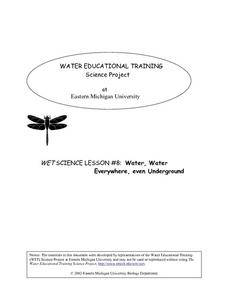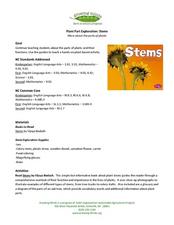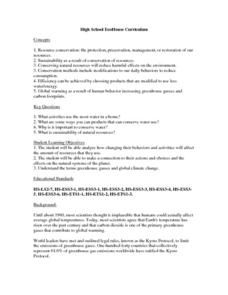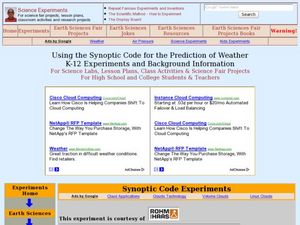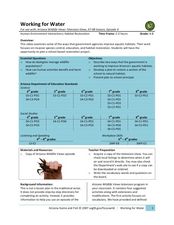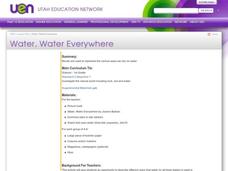Curated OER
Water, Water Everywhere, Even Underground
The "Engage" section of a wetlands lesson plan asks young ecologists to examine a wetlands poster. You can easily find one online and display it using a projector. Pupils immerse a piece of sandstone and a piece of granite in water to...
Curated OER
Plant Part Exploration: Stems
Explore water transport in plant stems using this fun experiment! Your scientists will start by reading Stems by Vijaya Bodach. Then, activate prior knowledge about plant stem functions and water transportation....
Curated OER
High School EcoHouse Curriculum
How has the level of carbon dioxide changed over recent years, and what is contributing it? Groups work together to research and present their findings in a creative way. Also built into the lesson is a visit to a sustainable house, but...
Curated OER
Using the Synoptic Code for the Prediction of Water
Learners construct a thermoscreen for the experiment. In this earth science lesson, students make observations and interpret them using synoptic codes. They predict the weather based on gathered information.
Curated OER
Working for Water
Students examine the ways that government works to help improve aquatic habitats. In this water habitats lesson students view a video and plan a school restoration project.
Curated OER
The Water Cycle: A Repeating Pattern in Nature
Students are introduced to the terms related to the water cycle in their native language. In groups, they describe the steps of the cycle using different materials found in their art classroom. They describe how energy helps water...
Curated OER
Water, Water Everywhere
First graders study water-its properties, its 3 states, and the way we rely on it for everyday living. They read Water, Water Everywhere, draw murals of where they have seen water and the ways they use it and eat/drink snacks that are...
Curated OER
Who Will Care for the Water?
Students discover how humans impact natural resources. In this environmental lesson, students identify water resources in the local area and construct a T-chart to compare the positive and negative effects humans have on water resources.
Curated OER
The Global Precipitation Measurement Mission (GPM) Lesson
Introduce your class to one of the ways that technology is benefiting humanity. The Global Precipitation Measurement Mission involves the data collected by nine satellites from different countries with a united focus on studying world...
Herff Jones Education
Chemical Energy
Provide the class with a quick lesson on chemical energy as they are assisted in creating hot and cold packs to demonstrate energy transfer between objects. They observe the energy change in matter as it transforms and...
Serendip
Food, Energy and Body Weight
High schoolers learn why humans need calories, how they control weight with food choices, and the impact of exercise on energy. Scholars then apply their understanding to a case study of lunch choices and exercise.
It's About Time
Volcanic Landforms
Did you know the word volcano comes from the name of the Roman god of fire, Vulcan? During this activity, scholars make a topographic map, interpret topographic maps, and infer how lava will flow based on their analysis.
Curated OER
Scientists Study Dinosaur "Mummy"
Students share ideas about how scientists know about dinosaurs, then read a news article about the recently found remains of a hadrosaur. In this dinosaur lesson plan, the teacher introduces the article with a class discussion and...
Curated OER
Prairie Mural Project
Seventh graders construct a large mural of a praire showing plants, and animals that would live there.
Curated OER
Penguins Around the World
Young scholars investigate penguins. In this Science lesson plan, students compare and contrast penguins to flying birds. Young scholars use a Venn diagram to illustrate the differences and similarities of penguins and flying birds.
NOAA
Fishy Deep-sea Designs!
Oceans represent more than 80 percent of all habitats, yet we know less about them than most other habitats on the planet. The instructor introduces the epipelagic, mesopelagic, bathypelagic, twilight, and midnight zones in the ocean....
Global Change
Impact of Climate Change on the Desert Pupfish
A fish that lives in the desert? You and your class can meet the desert pupfish as they examine its habitat, the role humans play in diminishing water supplies, and how climate change might impact this fishy friend. There are four short...
It's About Time
Making Waves
Young scientists use Slinkys to better understand waves. After creating and measuring many aspects of waves, they complete a handout and homework questions. The resource also introduces the final project for the chapter, though...
Curated OER
Pollution is Not a Solution
Students explore the environment by completing science worksheets in class. In this water conservation activity, students identify ways water is used in our society and how we abuse the privilege. Students discuss methods to reduce water...
Utah LessonPlans
Water, Water Everywhere
Murals are used to represent the various ways we rely on water.
Curated OER
All About Me-I'm My Own Research Project
Third graders see how to do a research project. They understnad how to categorize information about themselves and relate it to information on sea animals for a future research project. This activity fits in nicely with any unit on animals.
Curated OER
Deformed Frogs! - The Parasite Hypothesis
This project provides students the opportunity to investigate parasites as a possible cause of the observed frog deformities. It asks students to view web-based evidence and interpret whether it supports the parasite hypothesis. Students...
Curated OER
Sopay Water
Tenth graders design and conduct an experiment to explore the use of several substances in removing soap from water. During this activity they work with a lab partner. They keep their own individual lab notes, after they finish, they...
Curated OER
Water-our Precious Resource
Students complete a unit of lessons on water as a limited resource. They conduct Internet research, record information in electronic journals, utilize spreadsheets, conserve water and record the results, and conduct water safety tests on...


